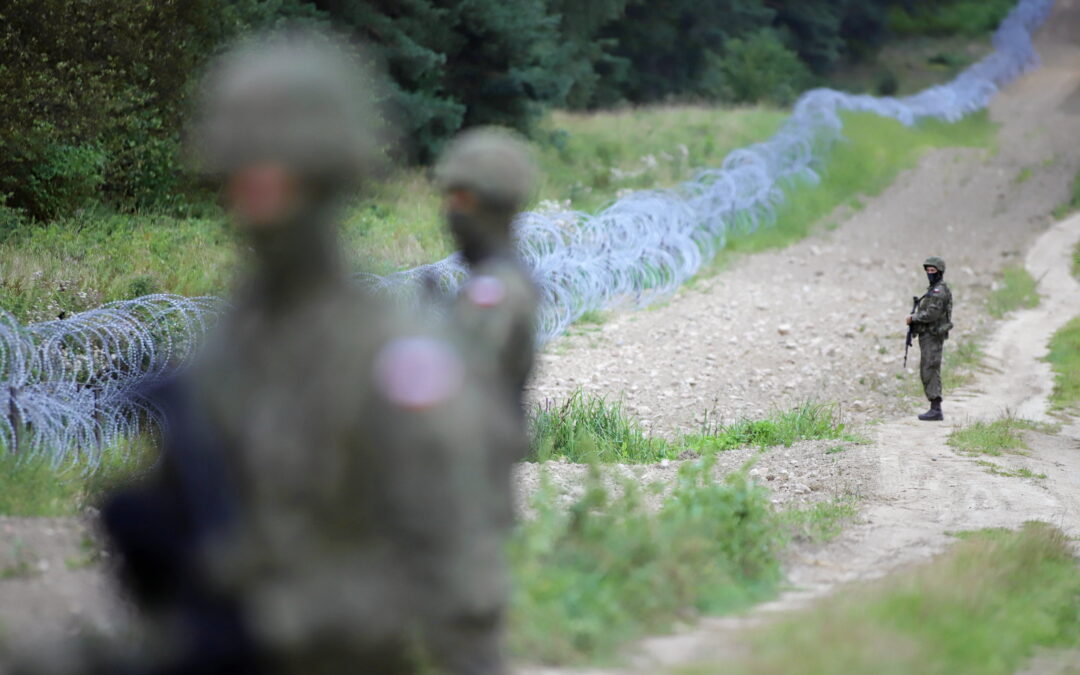By Patryk Wachowiec
Last Thursday, President Andrzej Duda issued a decree introducing a state of emergency along Poland’s border with Belarus at the request of the government. His decision was this evening approved by parliament.
The officially stated purpose is to ensure public order amid an ongoing surge in attempts to cross the border illegally. However, taking into account events at the border and the government’s track record, there are legitimate doubts as to the real reasons behind such an extraordinary measure.
Why was a state of emergency introduced?
The state of emergency, announced for the first time since 1981, when the then communist authorities declared martial law, is initially intended to last 30 days. It was requested by the Polish government in response to actions supported by the Belarusian regime, which has been encouraging migrants from Africa and Asia to travel to Belarus, where they are transported to the EU border and allowed to illegally cross them.
Warsaw maintains that these actions are part of a “hybrid war” against the EU. In the explanatory memorandum attached to the motion for introduction of the state of emergency, the government says that “the exceptional nature and scale of migratory pressure on the Polish-Belarusian border stems from deliberate and planned actions of the Belarusian authorities aimed at destabilising the situation on the border”.
What does the state of emergency mean in practice?
The decree signed by President Duda restricts certain constitutional rights and freedoms in the area concerned. During the emergency state, public assemblies and mass gatherings are suspended. No one other than those who live, work or study in the area is permitted to enter it. Every person is required to hold an identity card on public premises.
However, some limitations are of a wider scope and may concern people residing outside the area in question. The decree prohibits capturing images of the border area and infrastructure therein, as well as recording border guards, police and the military. Moreover, it restricts freedom of information on activities which are undertaken “in relation to safeguarding the state border or preventing illegal migration”.
The latter was justified by the need to reduce the amount of information in the public domain as it may reduce the effectiveness of actions to cope with the “hybrid war” on the border. Failure to comply with these restrictions is punishable by arrest or fine.
What is the legal basis for a state of emergency?
From the constitutional perspective, a state of emergency can be introduced in situations of “particular danger”, if “ordinary constitutional measures are inadequate” and “in the case of threats to the constitutional order of the state, to security of the citizenry or public order”.
The President of the Republic has the power to announce that emergency state for no longer than 90 days following a request from the government. Within 48 hours from its introduction, the state of emergency must be approved by the lower house of parliament, the Sejm. Should it decide not to accept that state, it is considered as immediately repealed. The state of emergency can be extended only once under the same procedure, for no longer than 60 days.
These constitutional requirements must be confronted with the context in which the state of emergency was introduced, as well as with the official explanations provided by the government.
Is the state of emergency justified?
There is little room for questioning the existence of particular danger and threats to public order in the area concerned. Undoubtedly, the increased attempts to illegally cross the border, apparently supported by the Belarusian authorities, require an appropriate response. However, one should ask whether the requested measures are adequate and meet all the criteria set out in the constitution.
In this respect, it should be noted that the main difference between martial law and the state of emergency lies in the origin of the threat. If the government were to be consistent, in order to prevent the “hybrid war” from Belarus, it should trigger martial law rather than a state of emergency. The latter, according to the constitution, is designed for threats coming from within, such as mass riots or an attempt to illegally seize power.
A state of emergency can also be introduced if “ordinary constitutional measures are inadequate”. However, the ruling majority has all the ordinary tools at its disposal. They can call the parliament, amend laws or introduce secondary legislation to give new powers to border guards or the police. Similarly, most of the mentioned limitations are still constitutionally justifiable and it is not necessary to announce the state of emergency to introduce them.
However, the reasons behind the announcement of the state of emergency may not be the same as those officially presented by the government. The explanatory memorandum uses very ambiguous wording to justify the need for such a state. It refers to “certain activities” close to the Polish border and fails to provide genuine and objective explanations for the state of emergency that an ordinary citizen can rely on. The government failed to provide any convincing reason why other measures at its disposal are insufficient.
The EU's foreign affairs and security chief @JosepBorrellF says that the bloc "stands in solidarity with Lithuania, Latvia and Poland" against Belarus's "cynical” use of “migrants and refugees to artificially create pressure on our eastern borders" https://t.co/vLnbtSMXRv
— Notes from Poland 🇵🇱 (@notesfrompoland) September 4, 2021
Some members of the opposition have argued that the main aim is in fact to restrict access to Usnarz Górny, a village close to the Belarusian border where about two dozen migrants apparently from Afghanistan have been camping literally metres from Polish territory.
Despite an interim measure granted by the European Court of Human Rights, requiring Poland to provide them food, medicine and shelter (which does not mean that the migrants must be allowed to cross the border), for about three weeks the Polish authorities have tried to prevent NGOs, volunteers and a number of opposition MPs from communicating with them and giving them help.
In the meantime, the minister for interior affairs recently issued a regulation that allows border guards to push back migrants who have illegally entered Polish territory. In this particular context, by restricting the freedom of movement and the possibility to cover the events taking place at the border, there are grounds to believe that the state of emergency was introduced mainly to prevent the public from witnessing questionable activities in Usnarz Górny and other parts of the border.
Poland argues that the people on the border are economic migrants under Belarusian jurisdiction, and cannot be allowed to cross illegally.
But the UNHCR and Poland's human rights commissioner say they are asylum seekers and should be allowed to enter https://t.co/SBDCBRg1vp
— Notes from Poland 🇵🇱 (@notesfrompoland) August 25, 2021
Furthermore, there are doubts as to the extensive limitations on the freedom of information. As well as making it impossible to witness what is happening at the border, the government – again, using vague explanations – restricted access to information on all activities on the border for all citizens and the press.
Taking into account the requirements of proportionality, the government could have decided that responses to requests for access to public information would be provided only after the state of emergency has expired, rather than prohibiting the possibility of providing them at all – even after the state of emergency. It is certainly inadequate, as the government maintains, that all information related to the activities close to the border is of sensitive nature and must be restricted at all.
Finally, the approach of the ruling majority should be examined from the point of view of the COVID-19 pandemic. Despite an exceptionally large number of casualties, a breakdown of the health service, and an overwhelming effect on the economy, for more than 18 months the government decided not to trigger constitutional measures and introduce a state of natural disaster.
It rather opted to use ordinary legislation and governmental decrees to deal with the pandemic on a daily basis. That approach, compared to the situation on the border, raises further questions about its credibility and real intentions behind the state of emergency.
It is important to stress that both the state of emergency and the other constitutional extraordinary measures must be introduced following explanations that are clear and understandable for citizens. That is because in times of crisis, public trust is essential for the government to succeed, as well as for the citizens to believe that those measures are indeed used for adequate purposes.
Taking into account how the PiS majority has governed, in this instance there are serious doubts as to the real motives behind the state of emergency.
Main image credit: Grzegorz Dabrowski / Agencja Gazeta





















